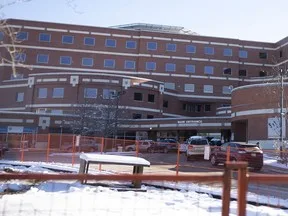“This (situation) shows that while we are a very welcoming, and hopefully inclusive province, we also still have some incredible warts that we have to deal with.”

Article content
One of Saskatchewan’s health care unions says the recent claims of racism against staff inside a Regina hospital may be a detriment to ongoing recruitment efforts overseas.
Ten doctors at Regina General Hospital have filed a complaint with the Saskatchewan Human Rights Commissions on Oct. 5, according to a report from CTV National.
Article content
The doctors allege that a change in leadership at the hospital saw scheduling adjustments to give premium teaching shifts, which come with an additional stipend and professional opportunity, to primarily white doctors on the department’s staff, leaving out BIPOC and internationally trained internal medicine specialists.
Advertisement 2
Story continues below
Article content
Details alleged in the complaint have yet to be proven in court.
SEIU-West president Barbara Cape says this is a snapshot of a serious concern for health care professionals, and especially as the province is in the midst of an ambitious recruitment campaign to address chronic staffing shortages plaguing the health sector.
“This is a bit of a black eye, for Saskatchewan, the fact that these doctors felt so strongly about this, they went to the Human Rights Commission,” said Cape.
“If people don’t think the reputation Saskatchewan has when incidents like this go public, if they don’t think that’s shared broadly, they’re not paying attention.”
Enticing and retaining internationally trained medical professionals is a large part of the province’s Health Human Resources Plan, launched last year.
As of November, 400 conditional offers have been extended to nurses from the Philippines, with 85 having accepted and now completing clinical training to certify them to work in the province.
Related Stories
Article content
Advertisement 3
Story continues below
Article content
On the floor of the chamber this week, NDP MLA Noor Burki questioned the health minister on what message a human rights complaint alleging systemic racism says to those who may be considering Saskatchewan as a career option.
“Imagine foreign health care workers looking up work conditions in this province and finding this story. They can go anywhere. Will they want to come work here?” he asked.
Minister Everett Hindley, also speaking in session, said discussion has taken place about this incident with senior leadership both at the ministry and the Saskatchewan Health Authority.
“There’s absolutely no room for racism here in our health care system or anywhere in Saskatchewan,” he said. “We do take this matter very, very seriously.”
The health authority said the issue was first brought to attention in May, and a “third-party investigation” launched in June, a report from which has not yet returned. Hindley said the Ministry of Health was also notified, but could not specify when.
“When it was brought to my attention, I asked our officials to immediately look into the situation,” he said.
Advertisement 4
Story continues below
Article content
Cape said her initial reaction to hearing about the complaint was “shock and disappointment, but not surprise.”
Approximately a third of SEIU-West’s membership, which encompasses licensed nurses, continuing care aides, technicians, food service and administrative staff, currently identifies as Indigenous or BIPOC.
Her union’s members have and still do report experiencing incidents of racism, overt or by way of offhand comments, in their workplaces, most often about languages spoken other than English.
“On a basic human level, that should not be acceptable, but we’re also a health care system in crisis,” Cape said.
“We can’t afford to marginalize workers of colour, or First Nations or Métis, or any members. We just simply can’t.”

The SEIU-West president said a first-step fix would be ensuring new staff are oriented during onboarding, and cultural sensitivity training is given more of a priority, both by employers and unions.
“We don’t prepare our workplaces and it’s hard for those new folks coming in, to just assimilate into this fast-paced workplace without orientation,” she said.
Advertisement 5
Story continues below
Article content
The health authority said it does conduct “compulsory cultural responsiveness training as part of employee orientation.” SEIU-West has also developed optional courses on diversity and inclusion, said Cape.
However, she feels education should extend to all staff, including those already on payroll.
“This (situation) shows that while we are a very welcoming, and hopefully inclusive province, we also still have some incredible warts that we have to deal with.”
With some online platforms blocking access to the news upon which you depend, our website is your destination for up-to-the-minute news, so make sure to bookmark leaderpost.com and sign up for our newsletters here so we can keep you informed.
Article content






Comments
Postmedia is committed to maintaining a lively but civil forum for discussion and encourage all readers to share their views on our articles. Comments may take up to an hour for moderation before appearing on the site. We ask you to keep your comments relevant and respectful. We have enabled email notifications—you will now receive an email if you receive a reply to your comment, there is an update to a comment thread you follow or if a user you follow comments. Visit our Community Guidelines for more information and details on how to adjust your email settings.